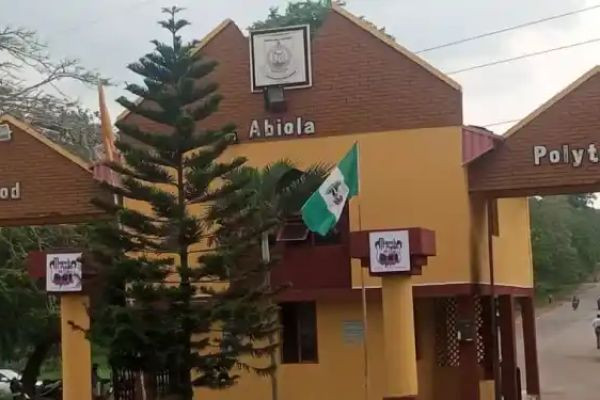Abeokuta, Ogun State — A recent visit by Nigeria Education News to the Moshood Abiola Polytechnic (MAPOLY), Abeokuta, has revealed a disturbing level of infrastructural decay across the once-renowned institution. Many of the polytechnic’s buildings are now in states of disrepair — with collapsing structures, leaking roofs, broken windows, and a glaring absence of maintenance.
The findings raise serious concerns about the sustainability of academic learning and the welfare of both students and staff within the institution.
Walking through the campus, the extent of neglect is hard to ignore. Lecture halls, offices, and laboratories are visibly deteriorating, while cracked walls and outdated equipment serve as reminders of years of deferred maintenance. For an institution once regarded as one of Nigeria’s leading centres for technical education, the current state of affairs paints a troubling picture.
“When it rains, we sometimes have to suspend lectures because water drips from everywhere,” lamented an HND 1 engineering student. “Nobody seems concerned about fixing it.”
This sentiment echoes the frustration of many students forced to learn in unsafe and uncomfortable environments.
Staff members are equally affected. Some lecturers told Nigeria Education News that they work in poorly ventilated offices without fans, stable power, or functional furniture. Many have resorted to bringing chairs and fans from home — a clear sign of institutional neglect.
Despite annual budgetary allocations for education at the state level, little appears to reach MAPOLY for infrastructure maintenance. Instead, the culture of “build and abandon” persists — where new projects are launched for publicity while older structures deteriorate.
A visit to the Science Complex revealed laboratories with broken doors, peeling paint, and obsolete equipment. Students admitted that practical classes are frequently disrupted due to the lack of tools, casting doubt on the polytechnic’s ability to produce industry-ready graduates.
In the Accounting Department, ceilings have collapsed and floors remain cracked. A staff union leader confirmed that multiple memos have been submitted to management, but meaningful action has not followed.
“Sometimes they patch one or two areas and leave the rest worse off,” the union leader said.
Even student accommodations are not spared. Although hostels are privately managed, many off-campus lodgings show signs of structural weakness. Students allege that the school’s lack of oversight allows landlords to cut corners, leaving them in unsafe living conditions.
Perhaps most troubling is the absence of visible renovation efforts on campus. During Nigeria Education News’ visit, there were no signs of ongoing repair or restoration projects, reinforcing the perception that management has grown indifferent to the infrastructure crisis.
Educational analysts warn that MAPOLY’s situation mirrors a broader national trend of poor maintenance culture in Nigerian tertiary institutions. Instead of sustaining existing facilities, authorities often prioritise new construction projects for political visibility — a practice that shortens building lifespans and wastes public funds.
The implications are dire. Deteriorating buildings not only endanger lives but also diminish the quality of education. Students struggle to focus in noisy, leaking halls, while lecturers are demotivated in decrepit offices. Over time, these conditions threaten the institution’s academic reputation and the competitiveness of its graduates.
Experts and stakeholders are now calling for urgent intervention. They advocate for regular infrastructure audits, transparent fund utilization, and a shift towards preventive maintenance.
“A good maintenance culture is cheaper than waiting for buildings to collapse before starting new ones,” said an education consultant. “MAPOLY must wake up to this reality.”
Ultimately, MAPOLY’s story is not just about decaying structures — it is a test of leadership accountability and policy discipline. Unless the Ogun State Government and the school’s management act swiftly, the institution risks further decline.
For a polytechnic that once stood as a symbol of excellence, MAPOLY’s current state is a sobering reminder that without maintenance, even legacy institutions can crumble.
Tags:
follow us on whatsapp
https://whatsapp.com/channel/0029VaAOIUe9mrGeBhrju12b
Download our Mobile App for easy access
https://play.google.com/store/apps/details?id=com.edutvmobile.ng&hl=en
Mobile App Lite
https://play.google.com/store/apps/details?id=com.edutvng.lite
https://play.google.com/store/apps/details?id=com.edutvmobile.ng&hl=en
Follow us on Youtube
https://youtube.com/@edutvnigeria
Follow us on LinkedIn -
https://ng.linkedin.com/company/edutvnigeria
Follow us on Instagram
https://instagram.com/edutvnigeria
Follow us on Facebook
https://www.facebook.com/edutvnigeria/









